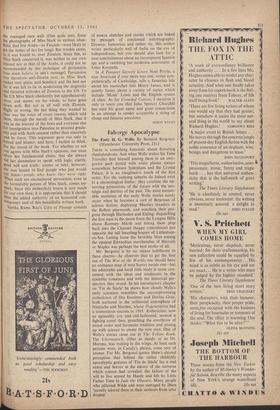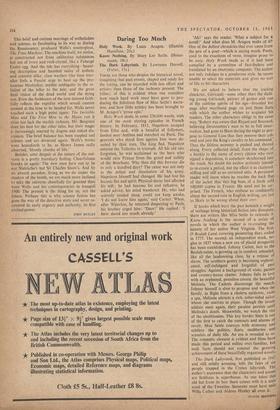Faberge Apocalypse
The Early H. G. Wells. By Bernard Bergonzi. (Manchester University Press, 21s.) The Early H. G. Wells. By Bernard Bergonzi. (Manchester University Press, 21s.) THERE is something futuristic about flowering rhododendrons. And when Wells makes his Time Traveller find himself among them in an over- grown park dotted with white plaster statues somewhere between Sydenham and the Crystal Palace, it is an imaginative touch of the first order. For the outlying suburbs do indeed exist in a chronological limbo :. they combine the un- nerving pretensions of the future with the nos- talgia and detritus of the past. The most memor- able moments of the early Wells stories surely occur when he becomes a sort of Betjeman of science fiction; deploying Martian invaders in the Byfleet pinewoods, and watching their pro- gress through Harlesden and Ealing; dispatching the first men in the moon from the Lympne Hills above Romney Marsh and letting them plop back into the Channel (happy coincidence) just opposite the tall boarding-houses of Littlestone- on-Sea. Letting loose the Invisible Man among the opulent Edwardian merchandise of Harrods or Maples was perhaps the best stroke of all.
Mr. Bergonzi is by no means indifferent to these charms—he observes that to get the best out of The War of the Worlds one should have an ordnance map of west Surrey beside one—but his admirable and lucid little study is more con- cerned with the ideas and tendencies in the scientific romances and with the historical per- spective they reveal. In his introductory chapter on 'Fin de Siècle' he shows how closely Wells's early scientism resembles the uncompromising aestheticism of Des Esseintes and Dorian Gray, both nurtured in the millennial atmosphere of Nietzsche and Nordau, whose Degeneration had a tremendous success in 1895. 'Estheticism, now so agreeably coy and old-fashioned, seemed a fighting creed then, preaching the overthrow of moral order and humanist tradition and joining up with science to create the new men. One of Wells's stories came out in The Yellow Book. The Ubermensch, either as dandy or as Dr. Moreau, was waiting in the wings. At least such persons were, in Cavafy's phrase, some sort of answer. For Mr. Bergonzi quotes Shaw's shrewd perception that behind the rather childishly apocalyptic gestures of 'Fin de Siecle' lay a real ennui and horror at the nature of the universe which science had revealed, the failure of the will to live sensed by Hardy and felt by Little Father Time in Jude the Obscure. Many people who pilloried Wilde and were outraged by Ibsen `secretly adored them as their saviours from utter despair.' This brief and curious marriage of aestheticism and science, as fascinating in its way as during the Renaissance, produced Wells's masterpiece, The Time Machine. The machine itself, we notice, is constructed not from utilitarian substances but out of ivory and rock-crystal, like a Faberge Easter egg. And the tale has everything—haunt- ing description and haunted satire of msthete and scientist alike, class warfare (the time trav- eller feels a Fascist urge to beat up the pro- letarian Morlocks); mythic ambiguity in the re- lation of the teller to the tale; and the great final vision of the dead world and the dying sun. Even the feebleness of the love interest faith- fully reflects the vapidity which sexual custom seemed at the time to be headed for. Wells never touched such a high point again; The Invisible Man and The First Men in the Moon run it close but lack the mythic richness. Mr. Bergonzi does his best for the other tales, but their magic is increasingly marred by dogma and naked dis- cussion. The brief balance has been toppled and science and art divorced again. Wells's books were henceforth to be, as Henry James sadly observed, `bloody chunks of life.'
Besides, utter despair at the nature of the uni- verse is a pretty transitory feeling. Cheerfulness breaks in again: The new men turn out tp, be not Nietische's but Sir Charles Snow's. And by an absurd paradox, living as we do under the shadow of the bomb, we are much more inclined to take the universe cheerfully for granted than were Wells and his contemporaries in tranquil 1900. The present is the thing for us, not the future. Perhaps this is why science fiction has gone the way of the detective story and never re- covered its early urgency and authority, its first excited power.
JOHN BAYLEY







































 Previous page
Previous page